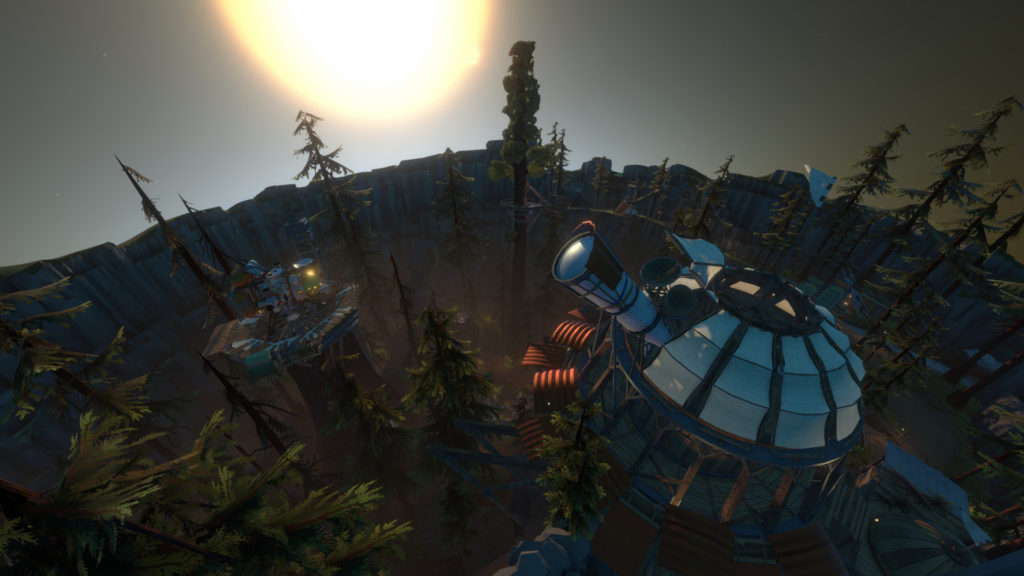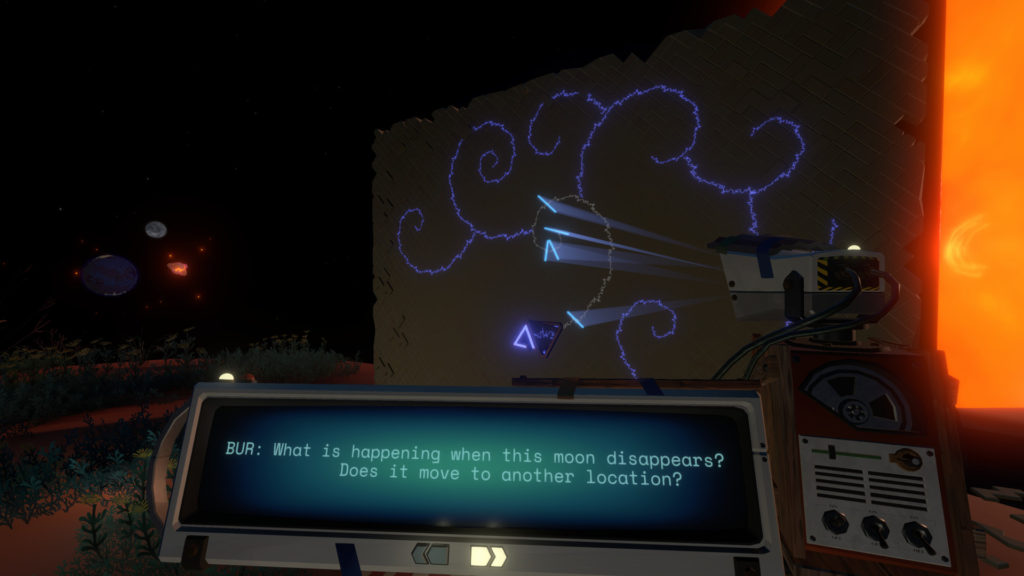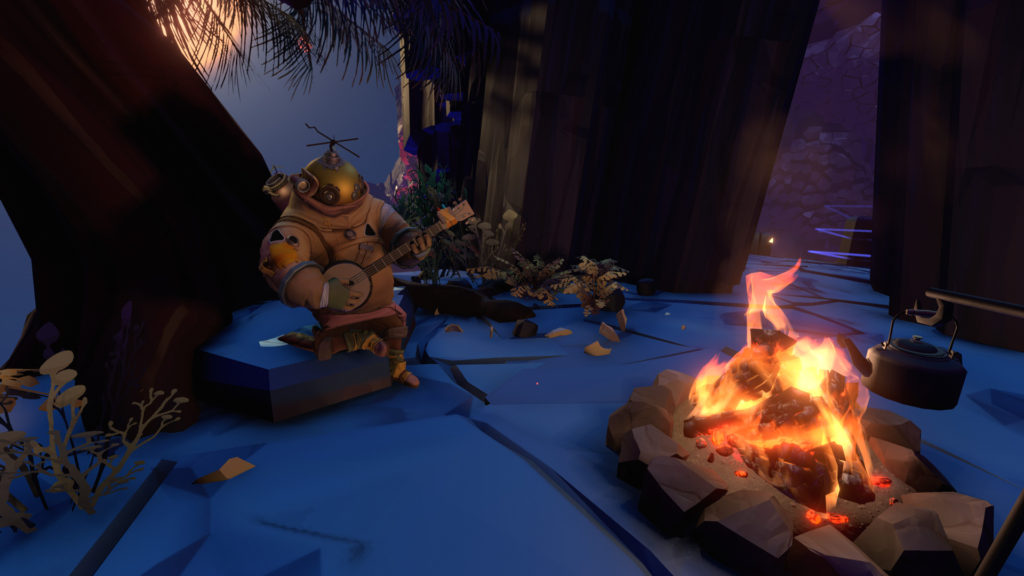
The Outer Wilds: Six Notes Make a Chord
There was a moment in playing Outer Wilds, where I flew off into the blackness of space because I knew the Supernova wasn’t far out. This run was burnt, I didn’t have time to do anything of importance, so maybe I could outrun it.
I started soaring at max speed, and got far enough away that I couldn’t see the planets anymore. I turned around so I was facing the system that my little pilot had grown up in, and I turned on the Signalscope. I had traveled so far, that all the planets were able to fit in my reticule, and I could hear every instrument that was being played by my fellow travelers in the system. They were playing in time with each other, even though they were planets apart. Music was literally connecting them, making sure they knew they were never alone, they were never forgotten by their friends, and they were all still a team.
It was beautiful, for a moment. Then, I saw the bright light of the supernova start coming for me, and I turned off the signalscope. I couldn’t bring myself to listen to the instruments, knowing they’d be snuffed out one by one by one by the sun exploding.
The Outer Wilds falls into step with games like Zelda and Sea of Thieves where the music is magic. It’s the point. Music can move mountains, it can send you back in time, it can bring a big shark out of the depths, and it can call out to you when you need it. When a game takes it’s music seriously like this, it’s always transformative to me. It’s not a backing track, it’s a theme.
A game’ts reverence for its music is always clear- you can tell when it’s important to the devs as soon as you’re first presented with it, and the game’s composer, Andrew Prahlow is no exception. When I turned on The Outer Wilds and heard the banjo hit its first notes I said to my wife “this is going to be exactly my shit.” The music has that dulcet, dreamy tone to it that feels like the image they have on the title screen. A small campfire on a smaller planet, spinning quietly in space. It has a slow building of a choir (maybe a sitar? It’s a chorus of something) and soft drums.

Then you boot into the game and you’re met with the “Timber Hearth” music, and you get introduced to the concept of instruments and the Signalscope. In this game, when people go to space, they take with them an instrument. The Signalscope can be used from the home planet to hear people on every other world. It can also hear distress signals, strange frequencies, and other space stuff but it’s the music that captures me. Your friends and neighbors will talk about how they like to tune in to listen to people playing, because they miss them. They talk about an ace pilot, Feldspar, who went out one day and never came back, but they talk about how you can still hear his harmonica.
And it’s true, you can hold your Signalscope up to the sky and be treated to drums, banjo, an oboe, the soft whistling of the older cosmonaut on the moon, and indeed, the harmonica of the lost pilot. If you try carefully, you can get them to sync up, but it’s a pain as you stand there, grounded on the planet.
Throughout the game, you use your tools to read the last words of the Nomai, a species of people that came long before you did. They’ve left record all across your solar system, explaining how they got here, how they lived, but cutting off before saying how they left. You learn the names of individual Nomai like you know the names of your fellow astronauts. But only through text. They are distinctly different from you because you can’t hear them like you can hear everyone else, they’re only there in their recorded conversations. Dead. Silent. You will never know the sound of a Nomai instrument.

Music as a narrative tool stays as the game reaches its conclusion, and it becomes my absolute favorite finale of this year. You find yourself on a strange, unknowable planet, campfire in front of you, with the sound of music coming from different parts of the pitch black forest around. You turn on your signal scope, and follow the music through the darkness to find the instrument. They’re floating in space, laying on the ground, but still playing their part in the song. You go after each, locking into it with the scope and hearing the sounds of your friends you’ve met throughout your journey. You can hear the harmonica you followed to find Feldspar, you can hear the drums from the hourglass-like planets, the memories come rushing back to you as you run through the pitch black of the forest.
You know these people, you know their songs, you know the importance they have together. Still in time.
You turn on your Signalscope again, after finding everyone, and hear the sound of a new instrument, a piano, playing the same song that you and your people have been the whole time. When you follow it, you find a group of skeletons standing around and pointing up. It’s the Nomai, the remains of a species of aliens that came long before you did. A species you’ve been learning about this whole game, but have never interacted with. The skeletons don’t move, they’re as devoid of life now as they have been all game, but you can follow their gaze up, and you can see that new instrument, the source of the song above you, and you jump.
You can’t reach it, and you come landing back down to earth- or you would if it wasn’t for the skeletons, who have moved to be under you. They’re standing on each others shoulders to lift you up, to get you closer to the instrument, to do what they’ve been doing all game, guide you. You jump again, and miss. More Nomai skeletons crowd around and stand taller, you jump again, and miss. A spaceship is there now, a Nomai one. You climb in it, flip the switch, and fly forward towards the music. And you grab it.

Now, with all your friends around the campfire, including a living representative from the Nomai, you talk to them. “I wonder what happens now” They say to you, as confused by this weird dream space as you are. “Is it time to find out?” You tell them yes, and then they respond, “this song is new to me, but I am honored to be apart of it.”
They’re not separated by distance anymore, not separated by time, they’re not even separated by life and death. They’re connected by their music, and finally they can all be part of the same song. The Outer Wilds is stunning, transformative, and by playing it I get to share in the song that is its experience. I get to bring my own instrument, gather around the campfire, and play.
And it sounds beautiful.






Haha wow, I love this. PLEASE keep posting! Can’t wait to read your next blog!